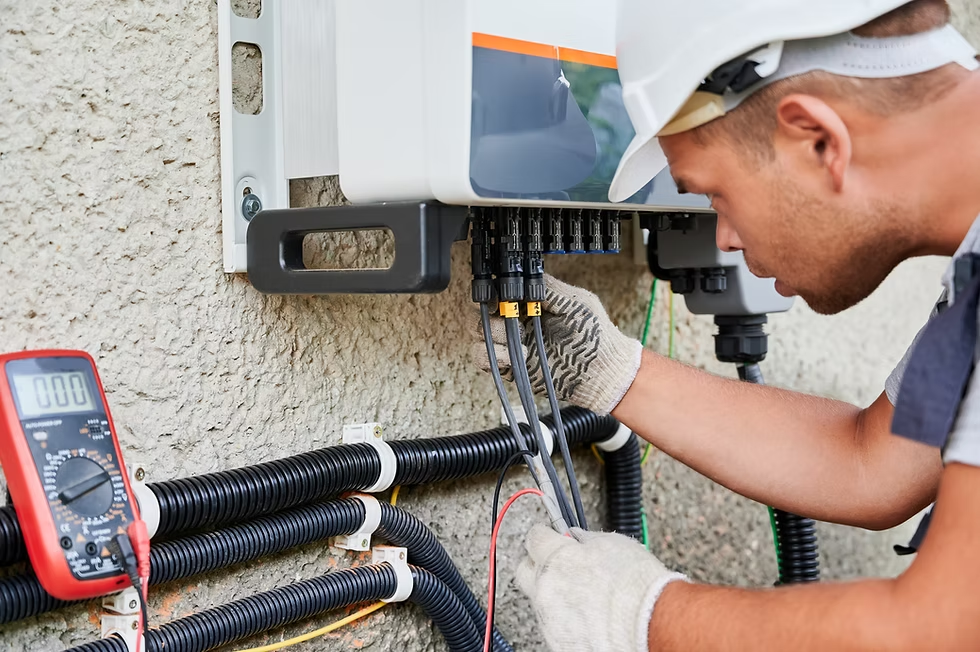
Solar panels are designed to be reliable, long-lasting, and low-maintenance — but like any electrical system, they sometimes need repair. Many homeowners don’t notice problems until their energy bill increases, their monitoring app shows unusual readings, or their system stops producing altogether.
Recognizing issues early can prevent full system shutdowns, roof damage, and expensive repairs later on. This guide highlights the most common signs your solar panels need professional attention and when you should schedule a diagnostic.
1. Your System Is Producing Less Power Than Usual
This is one of the easiest warning signs for homeowners to spot. If your system is suddenly producing:
- Significantly less power
- Lower output on sunny days
- Fluctuating production
- Uneven panel-level results
…it’s time for a diagnostic.
Common causes include:
- Loose wiring
- Failed optimizers
- Inverter issues
- Dirty panels
- Weather damage
A technician can quickly identify the root cause.
2. Your Monitoring App Shows Zero Production
When monitoring shows 0 kWh, it usually means:
- Inverter shut down
- Communication error
- Gateway or modem offline
- Failed component
- Wiring issue
- Breaker tripped
- System is actually offline
Zero production should never be ignored — your home may be pulling full power from the grid without you realizing it.
3. Inverter Lights Are Flashing or Red
Your inverter is the heart of the system, and its indicator lights tell you a lot.
Common warning signs:
- Red light
- Flashing yellow
- Fault code displayed
- “Ground fault,” “Arc fault,” or “Isolation fault” messages
- Inverter won’t turn on
These issues require a licensed solar electrician.
4. You Hear Buzzing, Clicking, or Unusual Sounds
Solar systems are normally silent.
Strange sounds can indicate:
- Loose wiring
- Arcing
- Failing inverter
- Failing optimizers
- Damaged connectors
Never ignore electrical noises — they can become safety hazards.
5. Visible Damage to Panels or Wiring
If you notice any of the following, schedule service immediately:
- Cracked or chipped panels
- Hot spots or discoloration
- Chewed wiring
- Exposed connectors
- Melted plastic components
- Broken mounts or loose hardware
- Water inside junction boxes
Storms, animals, and aging equipment can all cause visible damage.
6. Your System Turns Off During the Day
A solar system shutting down midday usually points to:
- Overheating inverter
- Voltage issues
- Wiring faults
- Failed sensors
- Arc fault conditions
This is one of the most serious warning signs and should be addressed quickly.
7. Your Roof Was Recently Replaced
If you recently replaced your roof and your solar panels were:
- Removed by roofers
- Improperly lifted
- Reinstalled without new flashing
- Reconnected incorrectly
- Wired incorrectly during reinstall
…it’s extremely common for systems to experience:
- Ground faults
- Wiring damage
- Loose connectors
- Production loss
A professional detach & reset is the only safe method for removing panels during roofing.
8. Your Energy Bill Suddenly Increased
If your bill jumps unexpectedly, your solar system may not be producing correctly.
Common causes:
- Monitoring offline (so you don’t notice production loss)
- Failed inverter
- Wiring damage
- Dirty panels blocking sunlight
- One or more panels offline
- Storm or hail damage
Your utility bill is often the first sign something is wrong.
9. Extreme Weather Recently Hit Your Area
Texas weather can impact solar systems more than most homeowners realize.
After:
- Hail
- High winds
- Thunderstorms
- Heat waves
- Freeze events
…it’s smart to schedule an inspection. Even minor storm damage can lead to bigger issues later.
10. Your System Is 5–10+ Years Old
As systems age, they’re more likely to experience:
- Inverter wear
- Aging wiring
- Loose connectors
- Failing optimizers
- Degraded components
Regular inspections help keep older systems running safely and efficiently.
When to Call a Professional Immediately
You should schedule a solar diagnostic right away if you notice:
- A burning smell
- Sparks
- Rapid overheating
- Water inside electrical components
- Smoke near the inverter
- Repeated system shutdowns
These issues pose safety risks and should never be ignored.
Why Homeowners in DFW Trust Sunaura Solar for Repairs
Homeowners choose Sunaura Solar because they provide:
- Licensed electrical repair
- Accurate diagnostics
- Safe, clean workmanship
- Brand-agnostic service for any system
- Thorough performance testing
- Clear communication and transparent scheduling
- Long-term support for the entire system
Whether your system needs minor repairs or full diagnostics, Sunaura ensures everything is done correctly and to code.














